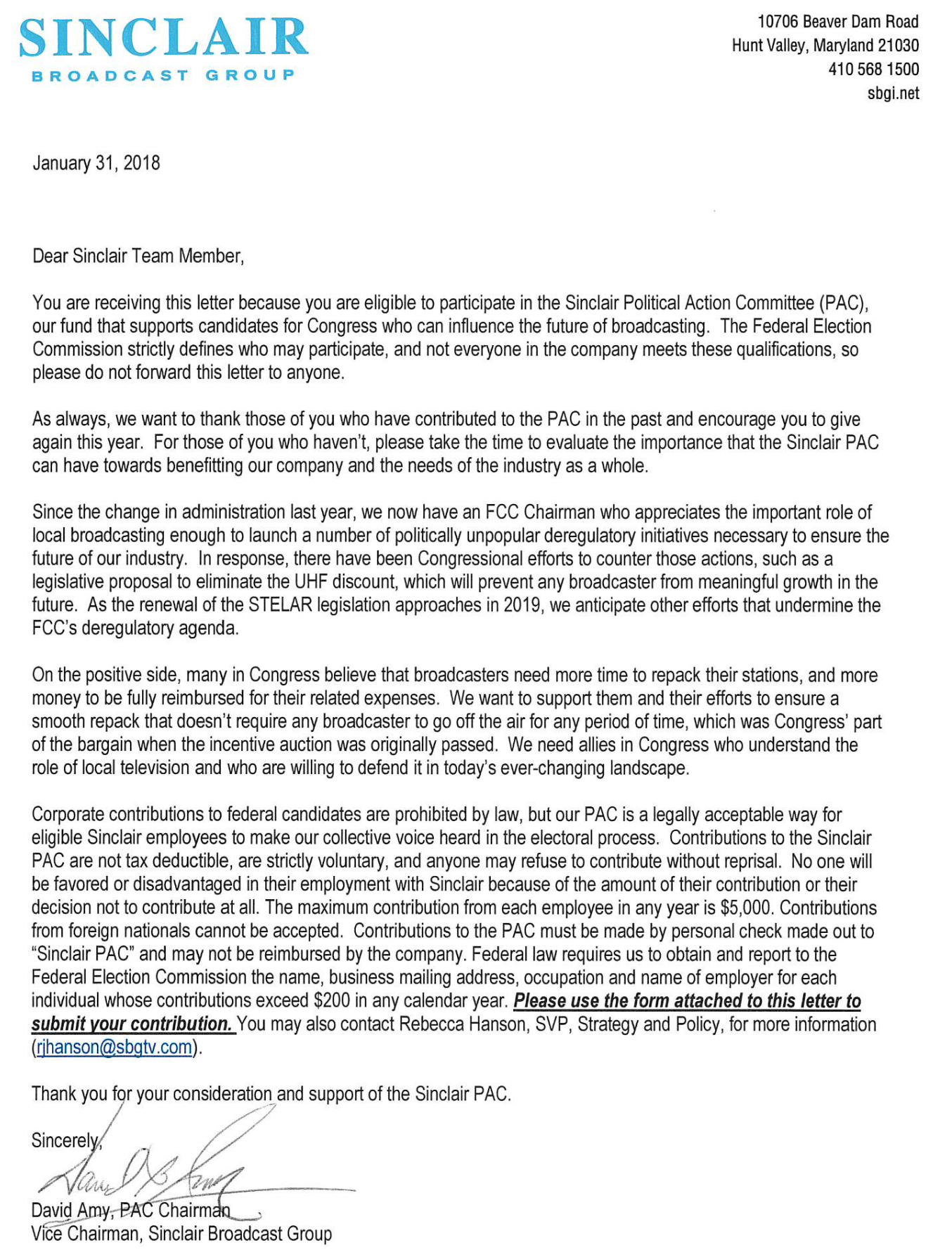The vice president for news for Sinclair Broadcast Group, Scott Livingston, told Poynter that he understands why some people may be concerned that the company asked top managers to contribute to the company's Political Action Committee, but he says he does not believe it is a journalistic conflict of interest.
"I do understand the concern but I don’t believe this compromises our journalistic integrity. Our local stations don’t cover the ins and outs of the broadcast regulatory reform." And, Livingston said, the political action committee is "working to save local broadcasting."
The memo, written by David Amy, the PAC chairman for Sinclair, was first discovered by the TV insider newsletter FTVLIVE.com a couple of weeks ago. It went out to what Livingston calls "top-level management" at Sinclair, which he says includes news directors at the group's local stations.
Sinclair is one of the biggest owners of local TV stations and is often the target of criticism for airing Republican-leaning commentaries at a time when the group is also trying to acquire Tribune Broadcasting and reach 72 percent of the country. Sinclair says it airs the commentaries to provide a point of view that other local stations ignore. In November, the Republican-controlled Federal Communications Commission relaxed ownership rules that would allow groups like Sinclair to expand their national reach. But the deal still requires Justice Department approval, which could come any day.
The potential conflict
The Society of Professional Journalists Code of Ethics includes this guidance about journalists being involved in the political process:
"Refuse gifts, favors, fees, free travel and special treatment, and avoid political and other outside activities that may compromise integrity or impartiality, or may damage credibility."
The Radio and Television Digital News Association's ethics code says:
"… political activity and active advocacy can undercut the real or perceived independence of those who practice journalism. Journalists do not give up the rights of citizenship, but their public exercise of those rights can call into question their impartiality."
However, local stations will certainly cover the mid-term elections in 2018 and some of the candidates who the Sinclair PAC has supported are in heated races.
The biggest recipient so far ($4,500) this year is Rep. Marsha Blackburn of Tennessee, a Republican who chairs the House Communications and Technology subcommittee, which oversees the FCC. Sinclair also has TV stations in Tennessee, where Blackburn is expected to face stiff competition in a race for the U.S. Senate this year. Sinclair's PAC also funds a member of Congress from New York, where the group owns seven stations, two congressmen from Pennsylvania, where Sinclair runs five stations, and two Texas candidates where Sinclair operates 13 TV stations. (See all of Sinclair PAC's filings on this FEC website.)
Sinclair's PAC is modest in comparison to many. So far in 2018 it has spent $36,000 distributing the money to members of Congress. The recipients include eight Republican members of Congress and two Democrats. Sinclair's PAC has given money to the campaigns of three GOP senators and two Democratic senators.
In 2016, the Sinclair PAC spent $89,000, again to both Democrat and Republican campaigns.
Livingston and at least seven local TV station general managers were modest contributors to the Sinclair PAC in 2016. No local news directors showed up on the Federal Election Commission's disclosure forms in 2016.
Rebecca Hanson, Sinclair's senior vice president for strategy and policy, told Poynter, “News directors were solicited in their managerial capacity. If a news director were to contribute to our PAC, which is very rare, as a manager they are choosing to contribute to our company effort — they don’t have a hand in how that contribution is used.”
Even though news directors decide what a newsroom covers and how it covers stories, Livingston insists that it is acceptable for news managers to donate to a PAC but staff should not. "The rank and file should not be involved in politics at all," he said. They should, "leave their politics at the door. This was intended to company managers."
To be clear, there is nothing illegal about donating to a political action committee as long as it is properly disclosed. And other media companies that own TV stations fund PACS. Disney, Viacom, News Corp., Comcast and many other media companies have PACs that lobby for issues dear to the corporations. And trade groups, including the National Association of Broadcasters, also lobby. You will recognize many contributor names on that list as well.
But news organizations generally have a prohibition against journalists, at any level, being involved in lobbying or politics. The Associated Press tells "editorial employees" including managers:
"Under no circumstances should they donate money to political organizations or political campaigns. They should use great discretion in joining or making contributions to other organizations that may take political stands."
The New York Times' Code of Ethics says: (I highlighted the most relevant portion pertaining to this article)
"Journalists have no place on the playing fields of politics. Staff members are entitled to vote, but they must do nothing that might raise questions about their professional neutrality or that of The Times. In particular, they may not campaign for, demonstrate for, or endorse candidates, ballot causes or efforts to enact legislation. They may not wear campaign buttons or themselves display any other insignia of partisan politics. They should recognize that a bumper sticker on the family car or a campaign sign on the lawn may be misread as theirs, no matter who in their household actually placed the sticker or the sign. Staff members may not themselves give money to, or raise money for, any political candidate or election cause. Given the ease of Internet access to public records of campaign contributors, any political giving by a Times staff member would carry a great risk of feeding a false impression that the paper is taking sides."
The Times counts managers in that word "staff," along with reporters, editors, editorial writers, photographers, picture editors, art directors, artists, designers, graphics editors and researchers.
The SPJ Ethics Committee offers this succinct advice to all journalists:
"The simplest answer is 'No.' Don’t do it. Don’t get involved. Don’t contribute money, don’t work in a campaign, don’t lobby, and especially, don’t run for office yourself."
I have a few questions now for you readers. And I invite you to comment below.
- If there is an outright prohibition against political involvement, how would journalists justify giving money to labor unions, which also are involved in political causes including campaigning for and endorsing candidates?
- And even if a news organization forbids journalists from being politically involved, newspapers commonly endorse candidates. Isn't it confusing to the public to say these employees cannot endorse or publicly support a candidate but these others can?
- If it is unethical for a journalist to contribute to a campaign, would it be unethical to be a member of a group that openly advertises that it attempts to influence Congress? For example, AARP is a powerful lobby for interests of seniors, including Social Security and Medicare. AARP spent $9.5 million lobbying last year. Disabled American Veterans and the Humane Society of the U.S. also spent big on lobbyists. My question is, how far removed must journalists be from the political process to be ethical? Aren't we all, in some way, represented by somebody trying to get our way in the political theater?
Share your thoughts with us below.
Meanwhile, here's the memo from Sinclair.







